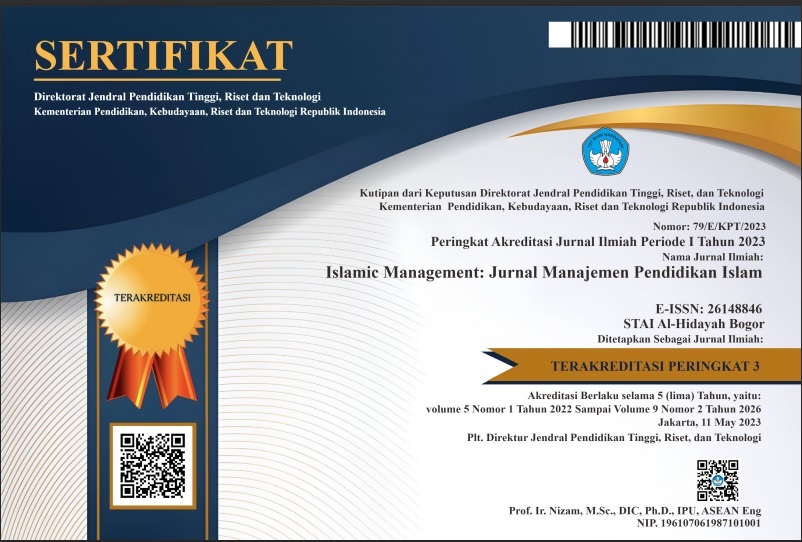Penyelenggaraan Program In-House Training Sebagai Upaya Membentuk Guru Profesional
DOI:
https://doi.org/10.30868/im.v4i02.1783Abstract
Tujuan penelitian ini adalah untuk mendeskripsikan program In-House Training (IHT) serta kelebihan dan kelemahan penyelenggaraannya sebagai upaya membentuk guru profesional. Penelitian ini menggunakan desain kualitatif dengan pendekatan studi kritis. Penelitian ini mengambil lokus pada beberapa lembaga pendidikan yaitu SMP Laboratorium Universitas Pendidikan Indonesia Bandung dan SMP Muhammadiyah 1 Leuwiliang Bogor. Partisipan dalam penelitian ini adalah Kepala Sekolah dan Guru di masing-masing lokus penelitian. Pengambilan data dilakukan melalui wawancara dan studi dokumentasi. Berdasarkan hasil analisis data dapat disimpulkan bahwa penyelenggaraan program in-house training dilakukan berdasarkan kebutuhan sekolah dan para guru dalam menciptakan iklim pembelajaran yang efektif khususnya dalam mendesain pembelajaran berbasis ICT. Hasil studi ini merekomendasikan bahwa penerapan IHT tidak cukup hanya melihat aspek kebutuhan, tapi juga nilai kemanfaatan yang berkelanjutan yang dapat menunjang kinerja profesionalisme guru.Â
Â
References
Achmad, S. S. 2003. “Model Pelatihan Profesional dalam Pembinaan Guru Sekolah Dasarâ€. Makalah disampaikan pada Rapat Lintas Sektoral Bidan Pendidikan. Retrieved from http://saidsuhilachmad.yolasite.com/resources/Model%20Pelatihan%20Guru.pdf.
Antono, B. 2013. “Mana yang Lebih Efektif: In House Training atau Public Trainingâ€. Retrieved from http://www.hrd-forum.com.
Archibald, S., Coggshall, J. G., Croft, A., & Goe, L. 2011. High-Quality Professional Development for All Teachers: Effectively Allocating Resources. Washington DC: National Comprehensive Centre for Teacher Quality. Retrieved from https://eric.ed.gov/?id=ED520732
Aseltine, J. M., Faryniars, J. O., & DiGilio, A. J. R. (2006). Supervision for Learning. USA: ASCD.
Binez, H., & Welton, J. M. 2005. Managing Partnership in Teacher Training and Development. New York: Routledge.
Creasy, Kim L. 2015. “Defining Professionalism in Teacher Education Programsâ€. Journal of Education and Social Policy, Vol. 2 (2), 23-25.
Denicolo, P. M., & Kompf, M. 2005. Teacher Thinking and Professional Action. New York: Routledge.
Devadas, B. 2016. “A Critical Review of Qualitative Research Methods in Evaluating Nursing Curriculum Models: Implication for Nursing Education in the Arab Worldâ€. Journal of Education and Practice, Vol. 7 (7). 119-126.
Dillon, S. 2016. Purpose of Internal Training for Employees. Retrieved from http://work.chron.com.
Gulamhussein, Allison. 2013. Teaching the Teachers: Effective Professional Development in an Era of High-Stake Accountability. USA: Centre for Public Education.
Hammound, L. D., Hyler, M. A., & Gardener, M. 2017. Effective Teacher Professional Development. Palo Alto, CA: Learning Policy Institute. Retrieved from https://learningpolicyinstitute.org/product/teacher-prof-dev
Hargreaves, A. 2000. “Four ages of professionalism and professional learningâ€. Teachers and Teaching: History and Practice, Vol. 6 (2),151-182.
Hariadi, F. 2021. “Peningkatan Kompetensi Profesional Guru dalam Proses Pembelajaran Daring Melalui In House Training di SMA Negeri 4 Tanah Putihâ€. Jurnal Pendidikan Tambusai, Vol. 5 (3), 6870-6880.
Jehanzeb, K. & Bashir, N. A. 2013. “Training and Development Program and its Benefits to Employee and Organization: A Conceptual Studyâ€. European Journal of Business and Management, Vol. 5 (2), 243-252.
Jost, Richard M. 2016. “Staff Training and Troubleshooting†dalam “Selecting and Implementing an Integrated Library Systemâ€. UK: Chandos Publishing. Retrieved from https://doi.org/10.1016/B978-0-08-100153-0.00012-5
Kanada, R. 2015. “Analisis Kebutuhan Pelatihan In-House Trainingâ€. Journal of Islamic Education Management el-Idare, Vol. 1 (2), 158-172.
Kaswan. 2011. Pelatihan dan Pengembangan untuk Meningkatkan Kinerja SDM. Bandung: Alfabeta.
Kitching, J., & Blackburn, R. 2002. “The Nature of Training and Motivation to Train in Small Firmsâ€. Research Report RR330, Small Business Research Centre Kingston University. Retrieved from https://core.ac.uk/download/pdf/4154524.pdf
Kumar, A., Singh, S. K., & Kumar, G. 2017. “Effectiveness of In-House Training on Technical Employees in Biotech Industryâ€. Journal of Technical Education and Training, Vol. 9 (1), 113-125.
Kusmayadi. 2021. “Effectiveness of in-house training to improve teachers' ability to ask questionsâ€. Action Research Journal Indonesia (ARJI), Vol. 2 (3), 165–176.
Özgelen, S. 2012. “Students’ Science Process Skills within a Cognitive Domain Frameworkâ€. Eurasia Journal of Mathematics, Science & Technology Education, Vol. 8 (4), 283-292.
Saharan, T. 2011. “Objective for Training: What Employees Perceive in Service Industryâ€. Kegee Journal of Social Science, Vol. 3 (1), 118-127.
Satori, D. (2016). Pengawasan dan Penjaminan Mutu Pendidikan. Bandung: Alfabeta.
Sucipto., Nugraha, N., & Rifai, M. 2020. “Upaya peningkatan kinerja guru melalui In House Training (IHT) berbantuan supervisi klinis di SD Negeri 3 Wonodadi Ngrayun Ponorogoâ€. Prosiding Konferensi Ilmiah Dasar, Vol. 2. Retrieved from http://prosiding.unipma.ac.id/index.php/KID/article/download/1554/1220
Sukirman. 2020. “Efektivitas Kelompok Kerja Guru (KKG) dalam Peningkatan Kompetensi Guruâ€. Indonesian Journal of Education: Management and Administration Review, Vol. 4 (1), 205-212.
Sulaimani, A., Sarhandi, P. S., & Buledi, M. 2017. “Impact of CALL in-house professional development training on teachers’ pedagogy: An evaluative studyâ€. Cogent Education, Vol. 4 (1), 1-12.
Wardoyo, C., Herdiani, A., & Sulikah. 2017. “Teacher Professionalism: Analysis of Professionalism Phasesâ€. International Education Studies, Vol. 10 (4), 90.
Downloads
Published
How to Cite
Issue
Section
Citation Check
License
Authors who publish with this journal agree to the following terms:
- Authors retain copyright and grant the journal right of first publication with the work simultaneously licensed under a Creative Commons Attribution License that allows others to share the work with an acknowledgment of the work's authorship and initial publication in this journal.
- Authors are able to enter into separate, additional contractual arrangements for the non-exclusive distribution of the journal's published version of the work (e.g., post it to an institutional repository or publish it in a book), with an acknowledgment of its initial publication in this journal.
- Authors are permitted and encouraged to post their work online (e.g., in institutional repositories or on their website) prior to and during the submission process, as it can lead to productive exchanges, as well as earlier and greater citation of published work (See The Effect of Open Access).







